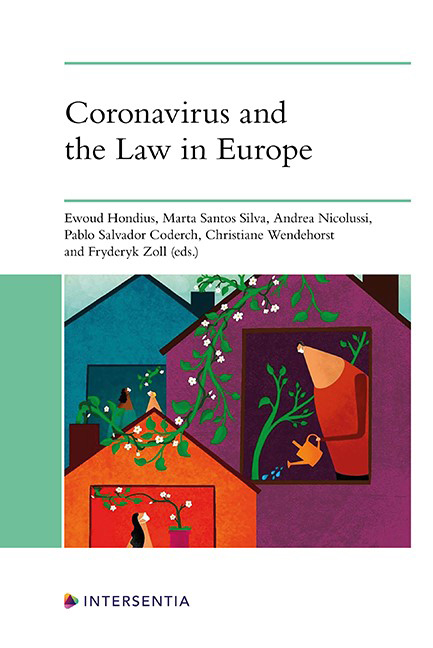Book contents
- Frontmatter
- Preface
- Contents
- List of Keywords
- List of Contributors
- PART I COVID-19 AND FUNDAMENTAL RIGHTS
- PART II STATES AGAINST THE PANDEMIC
- PART III COMPENSATION FOR COVID-19 RELATED DAMAGE
- PART IV CONTRACT LAW
- PART V CONSUMER LAW
- PART VI LABOUR AND SOCIAL LAW
- PART VII CORONAVIRUS CHANGING EUROPE
- Epilogue
- Annex: ELI Principles for the COVID-19 Crisis
- About the Editors
State Liability for the Management of the COVID-19 Crisis
Published online by Cambridge University Press: 10 December 2021
- Frontmatter
- Preface
- Contents
- List of Keywords
- List of Contributors
- PART I COVID-19 AND FUNDAMENTAL RIGHTS
- PART II STATES AGAINST THE PANDEMIC
- PART III COMPENSATION FOR COVID-19 RELATED DAMAGE
- PART IV CONTRACT LAW
- PART V CONSUMER LAW
- PART VI LABOUR AND SOCIAL LAW
- PART VII CORONAVIRUS CHANGING EUROPE
- Epilogue
- Annex: ELI Principles for the COVID-19 Crisis
- About the Editors
Summary
This contribution analyses whether and under which conditions the State ought to compensate for the losses caused when managing the COVID-19 crisis. It focuses, first, on instances where public authorities have accidentally caused the damage at issue either through actions or omissions. Secondly, it considers cases of State liability for lawful conduct, where public authorities deliberately have inflicted some damage on a person or a group of people for the sake of the public interest. The contribution takes Spanish law as a reference, which does not prevent the analysis from being extended to other legal systems based on similar principles.
INTRODUCTION
Millions of people have suffered or will suffer significant losses as a result of the COVID-19 crisis. This contribution analyses whether and under which conditions the State must compensate for those losses under Spanish law, whose principles on this issue are not far from those applicable in other European countries, despite appearances suggesting the contrary. That obligation to compensate may arise in four types of cases.
First, there might be instances of State liability in a strict sense, where a harmful event has been accidentally caused as a consequence of actions or omissions of some public authority.
Secondly, we can think of cases where the State deliberately inflicts some damage on a person or a group of people for the sake of the public interest. Unlike instances of liability in a strict sense, where a harmful accident decreases social welfare, here the governmental measures increase – or, at least, should increase – that welfare, but at the same time they involve a special sacrifice for some people, which is to be compensated. These measures might well be deemed expropriations. However, some courts and legal scholars have considered them as instances of State liability for lawful actions. Nevertheless, the big issue here is how to distinguish those measures that must be accompanied by a fair compensation (in my opinion, because they are expropriations, which are to be compensated pursuant to the Spanish Constitution) from those deprivations or restrictions of rights that do not need to be compensated.
Thirdly, there might also be cases of unjust enrichment, where the Government has experienced an unjustified enrichment at the expense of a person, and it must make restitution or compensate for it.
- Type
- Chapter
- Information
- Coronavirus and the Law in Europe , pp. 381 - 398Publisher: IntersentiaPrint publication year: 2021



